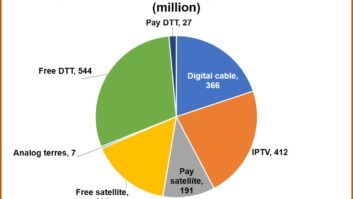
By Mark Errington, CEO, BroadStream
This year has seen the local TV project finally start to come to fruition, with the launches of services around the UK including London Live, Mustard TV in Norwich and Estuary TV in North Lincolnshire. But after the pre-launch collapse of Birmingham’s TV venture and announcement from the regulator Ofcom that it is “very unlikely” that all local TV stations it is licensing will succeed, many may think that the local TV experiment is in somewhat of a crisis.
However, research we commissioned earlier this year revealed that half of Brits (50 per cent) said they would be interested in watching programming relevant to their city or town, which points to an underlying interest that these new broadcasters can certainly capitalise on.
When it comes to the technical side of launching a local TV channel, the infrastructure and solutions are already available to enable a new service to get up and on air relatively quickly and easily. It’s not the technology that is going to define the success of these new channels, but the content they offer and how they successfully engage their audience. In fact, our research highlights the need for more local promotion about the launching of these new services, with three quarters of British TV viewers (75 per cent) not knowing that a local channel could be launching near them this year, with a further 15 per cent claiming to have heard of ‘local TV’ but not know where these channels are due to launch.
When it comes to what people want to watch, 70 per cent of these potential local TV viewers are most interested in watching local news programmes on their new channel, followed by over half (52 per cent) wanting to watch documentaries about their local areas and almost a third (30 per cent) keen to catch-up on their local sports teams. So there is clearly an appetite for truly local content on these new TV channels, despite the news in the last couple of weeks that London Live has agreed new programming commitments with Ofcom to actually reduce the amount of local content they broadcast.
One way that these new channels could gain access to a wealth of local knowledge and news has actually already been pointed to by the launch of the capital’s own service, which has been created with close ties to the Evening Standard, by virtue of them both also being part of the same media group. This gave the fledgling channel access to journalists and editorial resources from both newspapers to support news and current affairs programming, not to mention the opportunity to tap into existing communities through cross-platform advertising and promotions. In a media landscape where local newspapers and community websites are struggling to retain readers and advertisers alike, a tie-up with the new local TV channel also offers an interesting opportunity for new advertising models across both media platforms.
In addition, Neil Simpson, founding partner at ad agency The Corner and a former senior marketer at Coke and Adidas, said of London Live: “It clearly appeals to London-centric brands who would not normally consider TV, but it also offers a London up-weight option for a national buy.” Meaning these new advertising models could offer new opportunities to target these specific areas, whether they are a global brand or a local business.
There are certainly challenges ahead for local TV channels, so while they don’t necessarily have to worry about the technology to launch, there are still decisions to be made in order to find the right business model, generate great content viewers will watch and whether to partner with another local media company. Ultimately, local TV is in the midst of a five-year programme to see if it can succeed where regional TV failed and the keys to success will be ensuring they strike the right balance between revenues and views.







